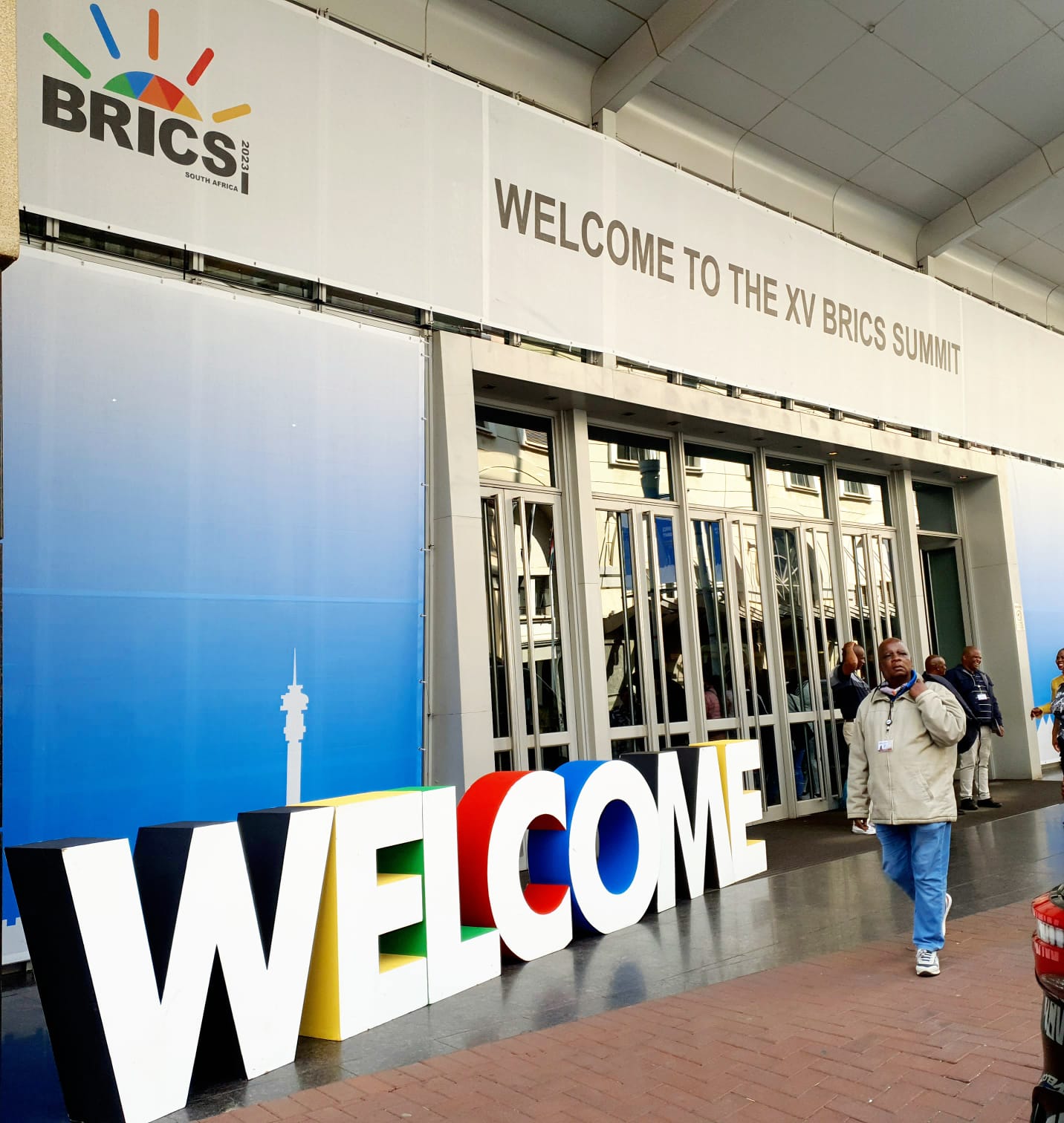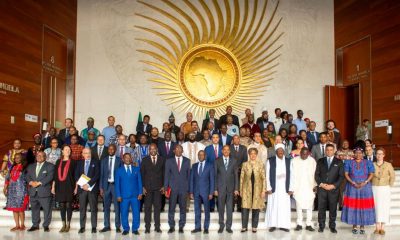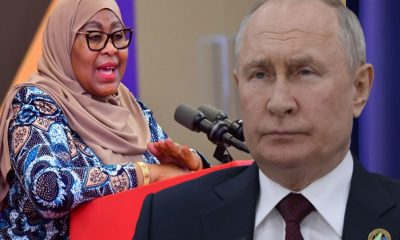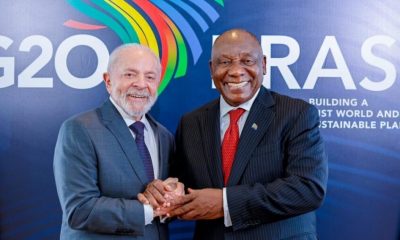World
BRICS and Africa: Balancing Interest Between Geopolitics and Development

By Kestér Kenn Klomegâh
BRICS (Brazil, Russia, India, China and South Africa), a group of emerging market powers and one of the most popular organizations, seeks to approve African States into its fold and build on its existing economic and trade with other invited African leaders during the 15th summit in Johannesburg, South Africa.
The BRICS members are meeting to deliberate on a broad range of important multiple issues, including new membership, common currency, various parameters of development and security and institutional architecture. More than 70 states are participating, including African leaders, while 23 States have submitted formal applications to join the group.
During his pre-summit visit to Addis Ababa, Foreign Minister Qin Gang pointed out Chinese support and solidarity with the government. Ethiopia’s relations with the West have deteriorated over the deadly conflict in its northern Tigray region.
In 2021, Washington imposed sanctions on Ethiopian officials involved in the conflict, cut aid and denied Ethiopia special access to the United States market under its African Growth and Opportunity Act of 2000. However, China accused the United States of meddling in Ethiopia’s internal affairs and assured Addis Ababa’s desire to join BRICS.
Ethiopian Prime Minister Abiy Ahmed has also been vocal on critical issues, most of the time urging African leaders to look for inside, within the concept of African Problems, African Solutions. His views are mostly focused on creating a fairer global system even while diversifying their partnerships under African strategies.
After a series of media monitoring and research, only three African States might gain membership into the bloc. These are Algeria, Ethiopia and Egypt. BRICS members have to agree on the criteria; the differences of opinion between China and India, as well as Brazil, preclude a quick resolution to the issue of accepting new members.
But both Brazil and India have promptly rebutted this “assumption” against BRICS expansion. The essence of BRICS lies in unity, and while India harbours concerns about China’s economic clout and has consistently asserted the border disputes.
Notwithstanding these, if expansion finally happens, it will bring the total African representation to four, including South Africa. It implies, in principle, the new members contribute to the changing processes and further give potential force for substantial geopolitical shifts.
Many experts believe that the expansion of BRICS would help Beijing promote its Belt and Road Initiative projects. The potential expansion of the group has set off alarms for Brazil and India, which are proud of BRICS’ exclusive nature. In this group, China is the strongest country from an economic point of view. It is really positioning itself as a leader of the Global South.
China needs raw materials, and Africa has a lot of them. China needs markets for its goods. It also needs investment projects, in particular for investing in infrastructure. China has a lot of companies building railroads, airports, and seaports. Chinese President Xi Jinping plans to hold a special meeting with African leaders to be chaired by the host South African Cyril Ramaphosa.
In addition, Xi and Ramaphosa are talking about strengthening ties and will witness the signing of some agreements with African delegations, according to the South African president’s office. China and South Africa would have comprehensive bilateral agreements.
Already on August 10, ahead of Xi’s visit, Chinese companies signed 20 deals to buy products worth US$2.2 billion from South Africa. South African Trade Minister Ebrahim Patel and Chinese Minister of Commerce Wang Wentao witnessed the signing at a joint economic and trade committee meeting aimed at boosting South African manufacturing exports to China. Anglo American Platinum, Glencore, Sappi and Pioneer Fishing were among South African companies involved in the agreements.
Across Africa, BRICS members are seen as important trade partners, sources of foreign investment and champions of the concerns of so-called developing countries, according to Tim Zajontz, a Research Fellow in the Centre for International and Comparative Politics at Stellenbosch University, South Africa.
“We can expect President Xi to stress at the summit that China and the BRICS are at the centre of South-South cooperation and ready to boost economic development across Africa,” Zajontz said, referring to collaboration among countries in the Global South.
In the run-up to the summit, however, the grouping’s shortcomings are in the spotlight. Some say there is a lack of coherent vision. “The objective necessity for a grouping like BRICS has never been larger,” said Rob Davies, South Africa’s former trade minister, who helped usher his country into the bloc in 2010. “The multilateral bodies are not places where we can go and have an equitable, inclusive outcome.”
Still, challenges abound for the BRICS and, indeed, the discussions surrounding its expansion. BRICS members have to reach the needed consensus; a broader problem was referred to recently by Jim O’Neill, namely that there is a lack of focus on pragmatic themes that matter for the economy and markets. Too much effort has sometimes been expended on secondary issues that have no bearing on the economy, markets or global governance.
Lord Jim O’Neill, a former Goldman Sachs economist who first gave the BRICS bloc its name, has slammed the idea of the five nations ever collaborating to create a common currency. But O’Neill, who coined the bloc’s name in a 2001 research paper, is unconvinced. “It’s just ridiculous,” he told the Financial Times in an interview. “They’re going to create a BRICS central bank? How would you do that? It’s almost embarrassing.”
De-dollarization is the latest buzzword to capture the market’s imagination and refers to efforts aimed at undermining the greenback’s command of global trade by promoting the use of other currencies.
According to the International Monetary Fund, proponents of the idea point to the fact that the dollar’s share of global reserves has fallen over the past two decades — though it still makes up nearly 60% of the world’s foreign-exchange holdings.
In the interview, O’Neill criticized the dollar’s role in directing the movements of other currencies around the world. “The dollar’s role is not ideal for the way the world has evolved,” he said. “You’ve got all these economies who live on this cyclical never-ending twist of whatever the (US Federal Reserve) decides to do in the interests of the US.”
Yaroslav Lissovolik, former Advisor to Russia’s Executive Director in the International Monetary Fund and currently the Founder of BRICS+ Analytics, argues that, despite the challenges and risks, BRICS+ together have the capability of creating a new layer of global governance that is represented by regionalism, i.e. coordination mechanisms for regional blocs and their development institutions.
With respect to the core, the BRICS are likely to unveil the main criteria for the expansion of the core, which may include, among other things, the economic weight of the candidate countries in their respective regions.
But before these grand plans are to materialize, BRICS needs to deliver on some of the most pressing issues for the global economy and for Africa, he explained and added “the best contribution is for BRICS to create and deliver through a support mechanism to the African States. This, for instance, would go a long way towards contributing to the success of the African Continental Free Trade Area (AfCFTA).
With an estimated 58 million population, South Africa is the 25th largest country in the world. South Africa welcomed and fully supported the adoption by African nations of the African Continental Free Trade Agreement (AfCFTA), which we believe will contribute tremendously in pursuit of the economic integration of our continent towards the attainment of our vision: Agenda 2063, the Africa We Want.
At a broad glance, Africa is becoming an essential part of the world. And it is a natural task for South Africa to promote the African agenda in this group. The theme: “BRICS and Africa: Partnership for Mutually Accelerated Growth, Sustainable Development and Inclusive Multilateralism” reflects the priority for Africa.
Four BRICS leaders will attend in person. Russian President Vladimir Putin will take part in the summit in an online format. Foreign Minister Sergey Lavrov will travel to Johannesburg to represent Russia at the summit in person.
But today, what is South Africa’s investment in BRICS? How do we assess the level of development and food security if BRICS control that huge natural resources and human capital? How has South Africa, these several years as the only African State in BRICS, used its membership to facilitate and promote investment from BRICS into the African continent?
Ultimately, the BRICS alliance represents a distinct shift in global power dynamics; it somehow provides a platform for greater influence and assertiveness on the global stage and will continue potentially reshaping the existing world order. At present, BRICS members account for 23% of the global gross domestic product and 18% of trade, further having around 42% of the world’s population.
World
African Visual Art is Distinguished by Colour Expression, Dynamic Form—Kalalb

By Kestér Kenn Klomegâh
In this insightful interview, Natali Kalalb, founder of NAtali KAlalb Art Gallery, discusses her practical experiences of handling Africa’s contemporary arts, her professional journey into the creative industry and entrepreneurship, and also strategies of building cultural partnership as a foundation for Russian-African bilateral relations. Here are the interview excerpts:
Given your experience working with Africa, particularly in promoting contemporary art, how would you assess its impact on Russian-African relations?
Interestingly, my professional journey in Africa began with the work “Afroprima.” It depicted a dark-skinned ballerina, combining African dance and the Russian academic ballet tradition. This painting became a symbol of cultural synthesis—not opposition, but dialogue.
Contemporary African art is rapidly strengthening its place in the world. By 2017, the market was growing so rapidly that Sotheby launched its first separate African auction, bringing together 100 lots from 60 artists from 14 foreign countries, including Algeria, Ghana, Mali, Nigeria, Senegal, and others. That same year during the Autumn season, Louis Vuitton Foundation in Paris hosted a major exhibition dedicated to African art. According to Artnet, sales of contemporary African artists reached $40 million by 2021, a 434% increase in just two years. Today, Sotheby holds African auctions twice a year, and in October 2023, they raised $2.8 million.
In Russia, this process manifests itself through cultural dialogue: exhibitions, studios, and educational initiatives create a space of trust and mutual respect, shaping the understanding of contemporary African art at the local level.
Do you think geopolitical changes are affecting your professional work? What prompted you to create an African art studio?
The international context certainly influences cultural processes. However, my decision to work with African themes was not situational. I was drawn to the expressiveness of African visual language—colour, rhythm, and plastic energy. This theme is practically not represented systematically and professionally in the Russian art scene.
The creation of the studio was a step toward establishing a sustainable platform for cultural exchange and artistic dialogue, where the works of African artists are perceived as a full-fledged part of the global cultural process, rather than an exotic one.
To what extent does African art influence Russian perceptions?
Contemporary African art is gradually changing the perception of the continent. While previously viewed superficially or stereotypically, today viewers are confronted with the depth of artistic expression and the intellectual and aesthetic level of contemporary artists.
Portraits are particularly impactful: they allow us to see not just an abstract image of a “continent,” but a concrete personality, character, and inner dignity. Global market growth data and regular auctions create additional trust in African contemporary art and contribute to its perception as a mature and valuable movement.
Does African art reflect lifestyle and fashion? How does it differ from Russian art?
African art, in my opinion, is at its peak in everyday culture—textiles, ornamentation, bodily movement, rhythm. It interacts organically with fashion, music, interior design, and the urban environment. The Russian artistic tradition is historically more academic and philosophical. African visual art is distinguished by greater colour expression and dynamic form. Nevertheless, both cultures are united by a profound symbolic and spiritual component.
What feedback do you receive on social media?
Audience reactions are generally constructive and engaging. Viewers ask questions about cultural codes, symbolism, and the choice of subjects. The digital environment allows for a diversity of opinions, but a conscious interest and a willingness to engage in cultural dialogue are emerging.
What are the key challenges and achievements of recent years?
Key challenges:
- Limited expert base on African contemporary art in Russia;
- Need for systematic educational outreach;
- Overcoming the perception of African art as exclusively decorative or ethnic.
Key achievements:
- Building a sustainable audience;
- Implementing exhibition and studio projects;
- Strengthening professional cultural interaction and trust in African
contemporary art as a serious artistic movement.
What are your future prospects in the context of cultural diplomacy?
Looking forward, I see the development of joint exhibitions, educational programs, and creative residencies. Cultural diplomacy is a long-term process based on respect and professionalism. If an artistic image is capable of uniting different cultural traditions in a single visual space, it becomes a tool for mutual understanding.
World
Ukraine Reveals Identities of Nigerians Killed Fighting for Russia

By Adedapo Adesanya
The Ukrainian Defence Intelligence (UDI) has identified two Nigerian men, Mr Hamzat Kazeem Kolawole and Mr Mbah Stephen Udoka, allegedly killed while fighting as Russian mercenaries in the war between the two countries ongoing since February 2022.
The development comes after Russia denied knowledge of Nigerians being recruited to fight on the frontlines.
Earlier this week, the Russian Ambassador to Nigeria, Mr Andrey Podyolyshev, said in Abuja that he was not aware of any government-backed programme to recruit Nigerians to fight in the war in Ukraine.
He said if at all such activity existed, it is not connected with the Russian state.
However, in a statement on Thursday, the Ukrainian Defence released photographs of Nigerians killed while defending Russia.
“In the Luhansk region, military intelligence operatives discovered the bodies of two citizens of the Federal Republic of Nigeria — Hamzat Kazeen Kolawole (03.04.1983) and Mbah Stephen Udoka (07.01.1988),” the statement read.
According to the statement, both men served in the 423rd Guards Motor Rifle Regiment (military unit 91701) of the 4th Guards Kantemirovskaya Tank Division of the armed forces of the Russian Federation.
UDI said that they signed contracts with the Russian Army in the second half of 2025 – the deceased Mr Kolawole on August 29 and Mr Udoka on September 28.
“Udoka received no training whatsoever — just five days later, on October 3, he was assigned to the unit and sent to the temporarily occupied territories of Ukraine,” the report read.
It added that no training records for Mr Kolawole have been preserved; however, it is highly likely that he also received no military training, but his wife and three children remain in Nigeria.
Both Nigerians, the report added, were killed in late November during an attempt to storm Ukrainian positions in the Luhansk region.
“They never engaged in a firefight — the mercenaries were eliminated by a drone strike,” UDI stated, warning foreign citizens against travelling to the Russian Federation or taking up any work on the territory of the “aggressor state”.
“A trip to Russia is a real risk of being forced into a suicide assault unit and, ultimately, rotting in Ukrainian soil,” the statement read.
In an investigation earlier this month, CNN reported that hundreds of African men have been enticed to fight for Russia in Ukraine with the promise of civilian jobs and high salaries. However, the media organisation uncovered that they are being deceived or sent to the front lines with little combat training.
CNN said it reviewed hundreds of chats on messaging apps, military contracts, visas, flights and hotel bookings, as well as gathering first-hand accounts from African fighters in Ukraine, to understand just how Russia entices African men to bolster its ranks.
World
Today’s Generation of Entrepreneurs Value Flexibility, Autonomy—McNeal-Weary

By Kestér Kenn Klomegâh
The Young African Leaders Initiative (YALI) is the United States’ signature step to invest in the next generation of African leaders. Since its establishment in 2010 by Obama administration, YALI has offered diverse opportunities, including academic training in leadership, governance skills, organizational development and entrepreneurship, and has connected with thousands of young leaders across Africa. This United States’ policy collaboration benefits both America and Africa by creating stronger partnerships, enhancing mutual prosperity, and ensuring a more stable environment.
In our conversation, Tonya McNeal-Weary, Managing Director at IBS Global Consulting, Inc., Global Headquarters in Detroit, Michigan, has endeavored to discuss, thoroughly, today’s generation of entrepreneurs and also building partnerships as a foundation for driving positive change and innovation in the global marketplace. Here are the excerpts of her conversation:
How would you describe today’s generation of entrepreneurs?
I would describe today’s generation of entrepreneurs as having a digital-first mindset and a fundamental belief that business success and social impact can coexist. Unlike the entrepreneurs before them, they’ve grown up with the internet as a given, enabling them to build global businesses from their laptops and think beyond geographic constraints from day one. They value flexibility and autonomy, often rejecting traditional corporate ladders in favor of building something meaningful on their own terms, even if it means embracing uncertainty and financial risk that previous generations might have avoided.
And those representing the Young African Leaders Initiative, who attended your webinar presentation late January 2026?
The entrepreneurs representing the Young African Leaders Initiative are redefining entrepreneurship on the continent by leveraging their unique perspectives, cultural heritage, and experiences. Their ability to innovate within local contexts while connecting to global opportunities exemplifies how the new wave of entrepreneurs is not confined by geography or conventional expectations.
What were the main issues that formed your ‘lecture’ with them, Young African Leaders Initiative?
The main issues that formed my lecture for the Young African Leaders Initiative were driven by understanding the importance of building successful partnerships when expanding into the United States or any foreign market. During my lecture, I emphasized that forming strategic alliances can help entrepreneurs navigate unfamiliar business environments, access new resources, and foster long-term growth. By understanding how to establish strong and effective partnerships, emerging leaders can position their businesses for sustainable success in global markets. I also discussed the critical factors that contribute to successful partnerships, such as establishing clear communication channels, aligning on shared goals, and cultivating trust between all parties involved. Entrepreneurs must be proactive in seeking out partners who complement their strengths and fill gaps in expertise or resources. It is equally important to conduct thorough due diligence to ensure that potential collaborators share similar values and ethical standards. Ultimately, the seminar aimed to empower YALI entrepreneurs with practical insights and actionable strategies for forging meaningful connections across borders. Building successful partnerships is not only a pathway to business growth but also a foundation for driving positive change and innovation in the global marketplace.
What makes a ‘leader’ today, particularly, in the context of the emerging global business architecture?
In my opinion, a leader in today’s emerging global business architecture must navigate complexity and ambiguity with a fundamentally different skill set than what was previously required. Where traditional leadership emphasized command-and-control and singular vision, contemporary leaders succeed through adaptive thinking and collaborative influence across decentralized networks. Furthermore, emotional intelligence has evolved from a soft skill to a strategic imperative. Today, the effective modern leader must possess deep cross-cultural intelligence, understanding that global business is no longer about exporting one model worldwide but about genuinely integrating diverse perspectives and adapting to local contexts while maintaining coherent values.
Does multinational culture play in its (leadership) formation?
I believe multinational culture plays a profound and arguably essential role in forming the kind of leadership required in today’s global business environment. Leaders who have lived, worked, or deeply engaged across multiple cultural contexts develop a cognitive flexibility that’s difficult to replicate through reading or training alone. More importantly, multinational exposure tends to dismantle the unconscious certainty that one’s own way of doing things is inherently “normal” or “best.” Leaders shaped in multicultural environments often develop a productive discomfort with absolutes; they become more adept at asking questions, seeking input, and recognizing blind spots. This humility and curiosity become strategic assets when building global teams, entering new markets, or navigating geopolitical complexity. However, it’s worth noting that multinational experience alone doesn’t automatically create great leaders. What matters is the depth and quality of cross-cultural engagement, not just the passport stamps. The formation of global leadership is less about where someone has been and more about whether they’ve developed the capacity to see beyond their own cultural lens and genuinely value differences as a source of insight rather than merely tolerating them as an obstacle to overcome.
In the context of heightening geopolitical situation, and with Africa, what would you say, in terms of, people-to-people interaction?
People-to-people interaction is critically important in the African business context, particularly as geopolitical competition intensifies on the continent. In this crowded and often transactional landscape, the depth and authenticity of human relationships can determine whether a business venture succeeds or fails. I spoke on this during my presentation. When business leaders take the time for face-to-face meetings, invest in understanding local priorities rather than imposing external agendas, and build relationships beyond the immediate transaction, they signal a different kind of partnership. The heightened geopolitical situation actually makes this human dimension more vital, not less. As competition increases and narratives clash about whose model of development is best, the businesses and nations that succeed in Africa will likely be those that invest in relationships characterized by reciprocity, respect, and long-term commitment rather than those pursuing quick wins.
How important is it for creating public perception and approach to today’s business?
Interaction between individuals is crucial for shaping public perception, as it influences views in ways that formal communications cannot. We live in a society where word-of-mouth, community networks, and social trust areincredibly important. As a result, a business leader’s behavior in personal interactions, their respect for local customs, their willingness to listen, and their follow-through on commitments have a far-reaching impact that extends well beyond the immediate meeting. The geopolitical dimension amplifies this importance because African nations now have choices. They’re no longer dependent on any single partner and can compare approaches to business.
From the above discussions, how would you describe global business in relation to Africa? Is it directed at creating diverse import dependency?
While it would be too simplistic to say global business is uniformly directed at creating import dependency, the structural patterns that have emerged often produce exactly that outcome, whether by design or as a consequence of how global capital seeks returns. Global financial institutions and trade agreements have historically encouraged African nations to focus on their “comparative advantages” in primary commodities rather than industrial development. The critical question is whether global business can engage with Africa in ways that build productive capacity, transfer technology, develop local talent, and enable countries to manufacture for themselves and for export—or whether the economic incentives and power irregularities make this structurally unlikely without deliberate policy intervention.
-

 Feature/OPED6 years ago
Feature/OPED6 years agoDavos was Different this year
-
Travel/Tourism10 years ago
Lagos Seals Western Lodge Hotel In Ikorodu
-

 Showbiz3 years ago
Showbiz3 years agoEstranged Lover Releases Videos of Empress Njamah Bathing
-

 Banking8 years ago
Banking8 years agoSort Codes of GTBank Branches in Nigeria
-

 Economy3 years ago
Economy3 years agoSubsidy Removal: CNG at N130 Per Litre Cheaper Than Petrol—IPMAN
-

 Banking3 years ago
Banking3 years agoSort Codes of UBA Branches in Nigeria
-

 Banking3 years ago
Banking3 years agoFirst Bank Announces Planned Downtime
-

 Sports3 years ago
Sports3 years agoHighest Paid Nigerian Footballer – How Much Do Nigerian Footballers Earn























